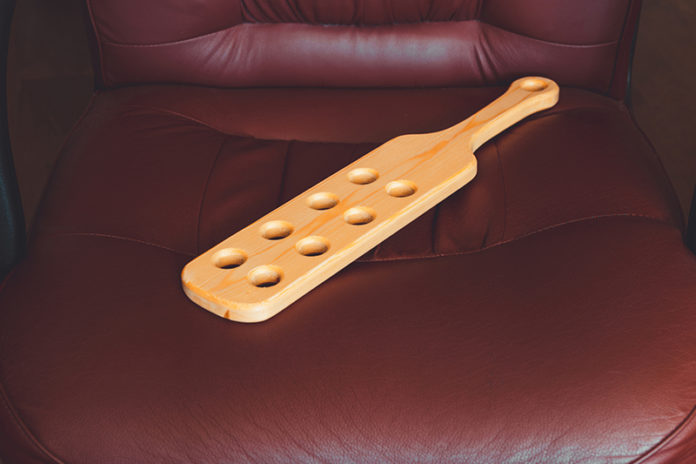Some parents don’t trust public school teachers to handle such topics as racism, sexuality and climate change. But in one Missouri town, they trust teachers to use violence against children. The Cassville School District recently decided to bring back corporal punishment.
Whacking kids’ bottoms with a wooden paddle may sound like an artifact of the 1950s, but in some places, it’s as familiar as Walmart. Missouri is one of 19 states that still allow the use of physical force by administrators on public school students.
Maybe the real news is how far out of step this decision is with public sentiment nationally.
Spanking in the home has steadily declined. In 1975, research indicates, 77% of parents with kids aged 3 to 11 said they spanked them. By 2014, only 49% did.
Nationally, the number of kids who experience corporal punishment in public schools has gone from 4% in 1978 to less than 0.5% today. In several states that allow it, the vast majority of schools do not.
It’s a measure of genuine social progress that a once-uncontroversial practice now elicits widespread rejection. Benjamin Spock, author of the hugely influential book “Baby and Child Care,” was often accused of coddling kids, but even he originally endorsed spanking — before repudiating it later.
Today, experts agree on the ill consequences. In a review of research, Elizabeth Gershoff of the University of Texas at Austin and Andrew Grogan-Kaylor of the University of Michigan noted that, in kids, spanking is associated with more aggression, more antisocial behavior, more mental health problems, more negative relationships with parents, as well as lower cognitive ability and lower self-esteem.
Parents may not read academic journals, but evidence slowly altered general attitudes. The data on the decline of spanking, according to a 2019 article in the Journal of Child and Family Studies, “may actually understate some aspects of the change, for example, the abandonment of more severe corporal punishment, like the use of belts or other implements.”
But other implements will be available in Cassville, at least for kids whose parents sign forms allowing this type of abuse — I mean, discipline. As Superintendent Meryl Johnson said, “The complaints that we have heard from some of our parents is that they don’t want their students suspended. They want another option.” The students themselves were not asked if they wanted to be hit by adults.
It’s no stunning revelation that in the 2020 election, Donald Trump got 80% of the vote in Barry County, where Cassville is located. Nor is it surprising to find that the states where corporal punishment is allowed in public schools are almost invariably states that voted for Trump. Corporal punishment is particularly popular among Republicans, Southerners, men and churchgoers, groups that are favorably inclined to Trump.
He’s a natural fit for those who think hitting people is healthy. At a 2016 rally, he told supporters, “If you see somebody getting ready to throw a tomato, knock the crap out of them, would you?” When a protester shouted “Black lives matter!” at another rally, attendees punched and kicked him, prompting this response from Trump: “Maybe he should have been roughed up, because it was absolutely disgusting what he was doing.”
Trump has also embraced torture. As a candidate, he vowed to “bring back waterboarding, and a hell of a lot worse.” The infatuation with brute force is part of his appeal.
It’s no coincidence that supporters of the supposed party of law and order are the group most likely to endorse violent protests against government. Sen. Lindsey Graham, R-S.C., warns that if Trump is prosecuted, the result will be “riots in the streets.”
One reason these citizens are likely to support using physical violence on children is that they were victimized by it when they were young. In their 2016 book “Raised to Rage,” UMass Boston psychology professors Michael Milburn and Sheree Conrad laid out their research demonstrating that “the more parents use physical punishment, whether they are liberal or conservative, the more authoritarian their children will be, and the more likely they will be to support punitive public policies like the death penalty and use of military force.”
But people of this mindset no longer represent a national consensus on spanking. Despite the Cassville decision, and despite the attitudes of Trump’s followers, corporal punishment is not about to stage a triumphant comeback. It’s just another front in the culture wars where conservatives are resisting progress but losing ground.






























